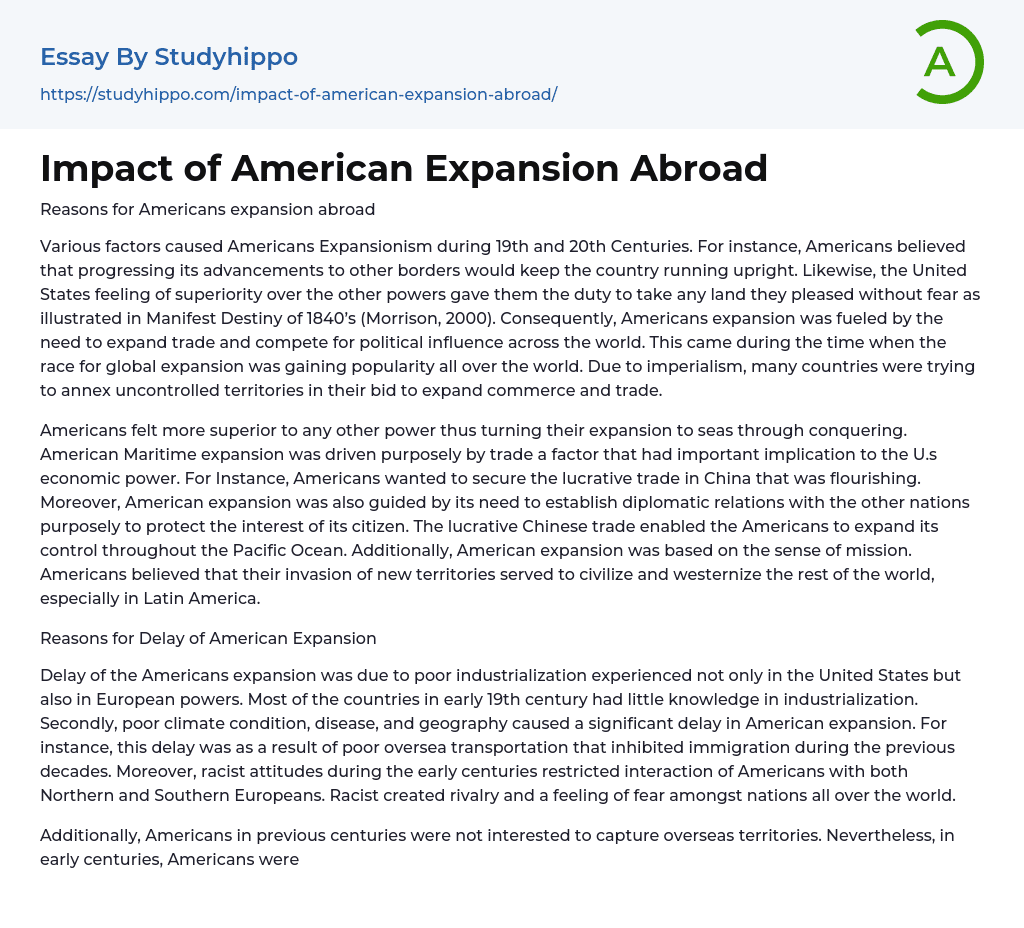Reasons for Americans expansion abroad
Various factors caused Americans Expansionism during 19th and 20th Centuries. For instance, Americans believed that progressing its advancements to other borders would keep the country running upright. Likewise, the United States feeling of superiority over the other powers gave them the duty to take any land they pleased without fear as illustrated in Manifest Destiny of 1840’s (Morrison, 2000). Consequently, Americans expansion was fueled by the need to expand trade and compete for political influence across the world. This came during the time when the race for global expansion was gaining popularity all over the world. Due to imperialism, many countries were trying to annex uncontrolled territories in their bid to expand commerce and trade.
Americans felt more superior to any other power thus turning their expansion to seas through conquering. American Mar
...itime expansion was driven purposely by trade a factor that had important implication to the U.s economic power. For Instance, Americans wanted to secure the lucrative trade in China that was flourishing. Moreover, American expansion was also guided by its need to establish diplomatic relations with the other nations purposely to protect the interest of its citizen. The lucrative Chinese trade enabled the Americans to expand its control throughout the Pacific Ocean. Additionally, American expansion was based on the sense of mission. Americans believed that their invasion of new territories served to civilize and westernize the rest of the world, especially in Latin America.
Reasons for Delay of American Expansion
Delay of the Americans expansion was due to poor industrialization experienced not only in the United States but also in European powers. Most of the countries in early 19th century had little
knowledge in industrialization. Secondly, poor climate condition, disease, and geography caused a significant delay in American expansion. For instance, this delay was as a result of poor oversea transportation that inhibited immigration during the previous decades. Moreover, racist attitudes during the early centuries restricted interaction of Americans with both Northern and Southern Europeans. Racist created rivalry and a feeling of fear amongst nations all over the world.
Additionally, Americans in previous centuries were not interested to capture overseas territories. Nevertheless, in early centuries, Americans were keen on restructuring their economy that was sabotaged by the series of domestic violence. Due to this, Americans wanted to reconstruct the shattered nation due to the civil war before they could advance to occupy other states. Other factors that caused the delay in American expansion ranges from American policy of isolationism to prevent military conflicts and European power struggles. Americans in the early years were financially unstable and quite small and not strong enough to create the empire in distant nations (Byler, 2006).
Impacts of American expansion to Latin America
The expansion of United States to Latin America led to the spread of imperialism in the Pacific. Through expansion, United States got the opportunity to build empires in Hawaii, Guatemala and Paraguay through trade. Secondly, it led to the rise of rivalries in Latin American. For instance, Latin American countries were torn into differences and internal fighting that resulted in poor industrialization.
Moreover, there was an emergency of the weak military to resist that were unable to resist foreign powers. Exploitation of Vast American markets and resources resulted due to American expansion. In addition to that, American expansion to Latin America led to
the rise of revolutions to resist Americans imperialism. Moreover, the spread of western culture and Christianity was an impact to the Latin American nations. Lastly, American expansion led to intense war. As a result, American Spanish war occurred due to the invasion of by both Americans and Spanish and in Cuba.
References
- Byler, C. A. (2006). Civil-military Relations on the Frontier and beyond, 1865-1917. Greenwood Publishing Group.
- Morrison, M. A. (2000). Slavery and the American West: The Eclipse of Manifest Destiny. Univ of North Carolina Press.
- Alaska essays
- Boston essays
- Brazil essays
- California essays
- Canada essays
- Chicago essays
- Costa Rica essays
- Florida essays
- Hawaii essays
- Latin America essays
- Los Angeles essays
- Mexico essays
- Slavery In America essays
- Usa essays
- Virginia essays
- Washington essays
- Cuban Missile Crisis essays
- Fidel Castro essays
- French Revolution essays
- Han Dynasty essays
- Hiroshima essays
- Imperialism essays
- Jack The Ripper essays
- Mao Zedong essays
- Middle Ages essays
- Mongols essays
- Nelson Mandela essays
- Ottoman Empire essays
- Reformation essays
- Reign of Terror essays
- Renaissance essays
- Roaring Twenties essays
- Romanticism essays
- Samurai essays
- Scientific Revolution essays
- Soviet Union essays
- Abolitionism essays
- Adam Smith essays
- American History essays
- American Revolution essays
- Ancient Egypt essays
- Articles Of Confederation essays
- Atlantic Slave Trade essays
- Aztec essays
- Benjamin Franklin essays
- Civil Rights Act of 1964 essays
- Civil Rights Movement essays
- Civil war essays
- Cleopatra essays
- French And Indian War essays




